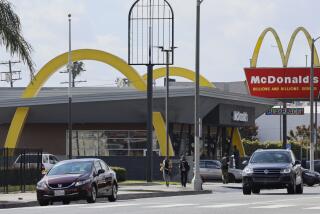Obama raises business leaders’ hopes
WASHINGTON — President Obama’s State of the Union address raised hope among business leaders for action this year on some of their priorities, including immigration reform, a corporate tax code overhaul and more trade deals.
But the domestic centerpiece of Obama’s speech — raising the minimum wage — drew strong opposition even as he took to the road Wednesday to rally public support for it.
Even so, those business issues face a common major obstacle: a congressional election year in which almost anything controversial isn’t likely to win approval.
That was clear when one of the items at the top of the business community’s wish list — so-called fast-track trade negotiating authority — suffered a major blow just hours after Obama finished speaking.
Senate Majority Leader Harry Reid (D-Nev.) said he opposed legislation granting the president the authority to strike trade deals that Congress cannot amend. So do many Democrats who are concerned that such power would lead to unfair trade deals that cost U.S. workers their jobs.
“I’m against fast-track,” Reid told reporters Wednesday. “I think that everyone would be well-advised just to not push this right now.”
Meanwhile, many business groups would like Obama to back off his push to increase the federal minimum wage to $10.10 an hour from $7.25.
“The economy is having a hard time creating jobs right now, and the prospect of a 40% increase in the minimum wage is almost inevitably going to cost some individuals a future opportunity to get a job,” said David French, senior vice president of government relations at the National Retail Federation.
His members, many of which rely on minimum-wage employees, and others argue that hiking base pay would hurt entry-level workers, such as teenagers, and the cost would be passed on to consumers in higher prices.
Obama zeroed in on a minimum-wage increase as part of his emphasis on closing the widening income gap between rich and poor and reviving the American Dream of upward mobility.
On Wednesday, he went to a Costco in Maryland to rally support for pending legislation to raise rates. Costco, where workers start at $11.50 an hour, is among companies that support an increase.
“If you work hard, you should be able to pay your rent, buy your groceries, look after your kids,” Obama said. “If you put in a hard day’s work, you deserve decent pay for it.”
Richard Trumka, president of the AFL-CIO, the country’s largest labor federation, said Obama’s call for an increase is “a good step.”
“Now we need congressional action,” Trumka said.
In his State of the Union speech, Obama also asked employers to raise their workers’ pay voluntarily. But Trumka said Washington needed to do more.
“You can’t just ask employers to raise wages,” he said. “You have to have a minimum wage that they’re obligated to pay.”
Most Republicans oppose a minimum wage increase, dimming the prospects for legislation this year.
But many Republicans support Obama’s push for expanded trade.
A key to that is trade promotion authority, which allows lawmakers to set guidelines for trade deals and consult with the president during negotiations. In exchange, the president gets a fast-track approval process that requires an up-or-down vote with no amendments. The authority expired in 2007.
“We need to work together on tools like bipartisan trade promotion authority to protect our workers, protect our environment and open new markets to new goods stamped ‘Made in the USA,’” Obama said in his Tuesday speech.
Expanded trade is vital for economic growth, said Jay Timmons, president of the National Assn. of Manufacturers.
“For manufacturers, trade agreements are critical to our ability to grow and invest; 95% of the world’s customers live outside the U.S.,” he said, noting that the president should have made a more forceful case for the authority.
But opponents said Obama didn’t aggressively push the issue because he knows it’s unpopular with his own party. Democrats are concerned it would be used to push through a broad Asia-Pacific trade deal, known as the Trans-Pacific Partnership, that the U.S. is negotiating with 11 other countries.
“I support his focus on reigniting the American Dream, but more fast-track authority to push a trade deal that is bad for American consumers and workers is a non-starter,” said Rep. Rosa DeLauro (D-Conn.).
Last fall, she wrote a letter to Obama signed by 151 House Democrats saying they would not support trade promotion authority legislation.
In addition to opposition from Reid in the Senate, some conservative Republicans oppose trade promotion authority because they believe it abdicates Congress’ power to amend trade pacts before approving them.
An overhaul of immigration laws could have a better chance of passage this year.
Last year, a bill passed the Senate that included a path to citizenship for undocumented immigrants, a provision many conservatives oppose. But House Republicans are set this week to consider a proposal from Speaker John Boehner (R-Ohio) that has a narrower path to citizenship than the Senate bill.
A broad array of business groups support immigration reform and were pleased that Obama made the case in his address.
Corporate tax reform is another areas of wide agreement in the business community. Obama “probably didn’t step on the accelerator hard enough” on the issue in his speech, said French of the retailers group.
House and Senate lawmakers still are working on drafting tax reform legislation, and the best the business leaders can expect this year is that progress be made. Generally, lawmakers avoid voting on such complicated and controversial legislation in an election year.
Puzzanghera reported from Washington; Lopez from Los Angeles. Times staff writer Michael A. Memoli in Washington contributed to this report.








